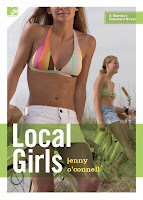STATUS: I’ve got a lot of phone calls to do to start my day.
What’s playing on the iPod right now? 50 WAYS TO LEAVE YOUR LOVER by Simon & Garfunkel
This one is certainly a lesser evil and in comparison to some of the other writer mistakes we’ve talked about this week, low on the totem pole. But I do think it’s worth mentioning although I’m pretty sure I’ve already discussed this at least once on my blog.
The overdone title.
A couple of thoughts to keep in mind:
1. Sometimes simple works—and works really well. (TWILIGHT for example). Don’t make a title more complicated then you need.
My client Jenny O’Connell has a great example of this with her two current back-to-back releases from MTV/Pocket Books: LOCAL GIRLS and RICH BOYS.


My sense is that you can probably figure out the direction of the story just from the titles. The first book, Local Girls, is about two teens who have grown up on island of Martha’s Vineyard. They are the local girls until one teen’s mother gets remarried to a rich tourist and takes the family from the island to Boston. The story takes place the next summer where the once local girl has returned as a tourist and will the friendship survive?
Rich Boys is, yep, you got it. A local girl hired to babysit a wealthy summer family’s little girl becomes entangled with the wealthy family’s older son who, after a disastrous first year of college, is bent on wreaking havoc.
Simple but grabby.
2. Avoid the pithy title with the long, rambling subtitle. I cannot tell you how often I see this. The title can be something like (and I’m making this up off the top of my head), The Survivor Chronicles (which could be a rather cool title if you think about it!). And then the author ruins it with the lengthy subtitle such as (and yes, this is an exaggeration)—a memoir about a young abused woman coming of age, discovering her bi-polarism, embracing her sexuality and finally triumphing against all odds.
Heck, I don’t need to read the book anymore…And yes, unfortunately, I do recognize that the professionals in the publishing industry are often guilty of this but as writers, there is no need for you to fall into this trap.
3. In general, avoid titles that might be hard to pronounce or difficult to spell.
4. To Be a Long Title or Not to Be a Long title? That is the question. And the answer is that it depends.
AND THEN WE CAME TO THE END works because as readers, we totally get it and the longer title is memorable.
Same with I’D TELL YOU I LOVE YOU BUT THEN I’D HAVE TO KILL YOU. We’ve all used a similar phrase often so the longer title works.
But then you have the power of the short title such as Brooke Taylor’s UNDONE.
This title can be read in so many ways. It leaves a question in the reader’s mind. What is undone? Does it mean incomplete? Or, to come undone? In this case, it’s the first question. What is left undone is the 5 wishes of a teen girl who dies and her best friend, Serena, decides to complete the list and in doing so, discovers who she really is.
.jpg)
The short title can be evocative.
And speaking of short titles and writer mistakes, you might want to check out this soon-to-be released slim volume called HOW FICTION WORKS by James Wood. Funny, he’s tackling all the issues that I’ve just talked about on this blog. Powerful stuff.



.jpg)